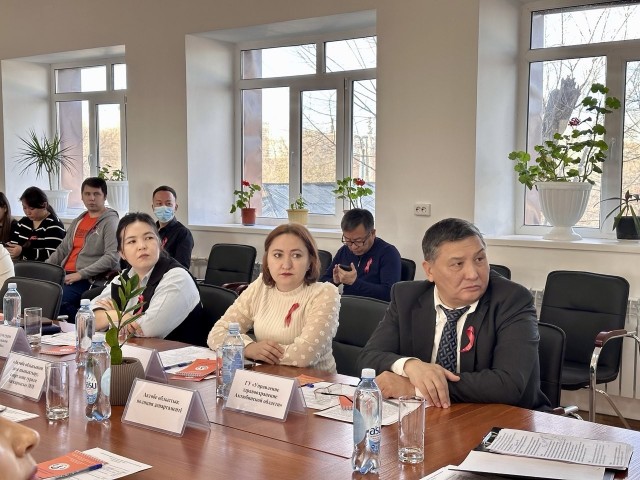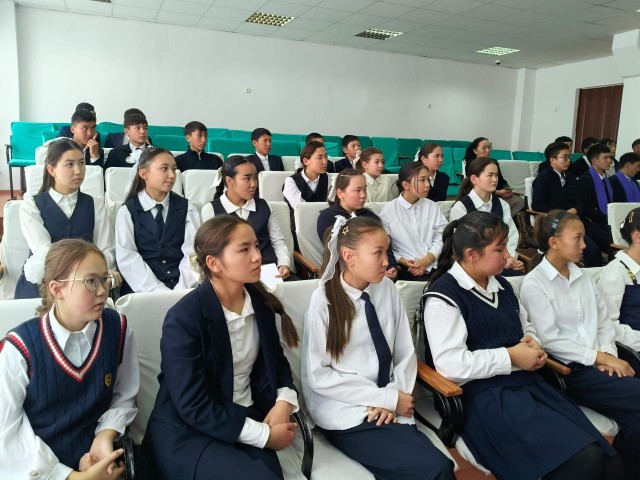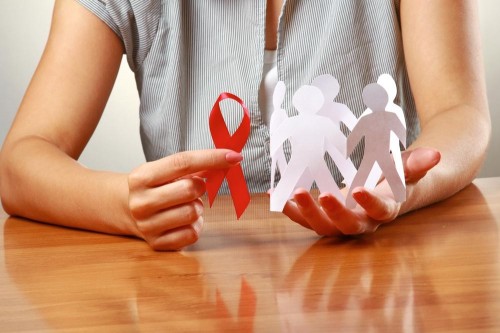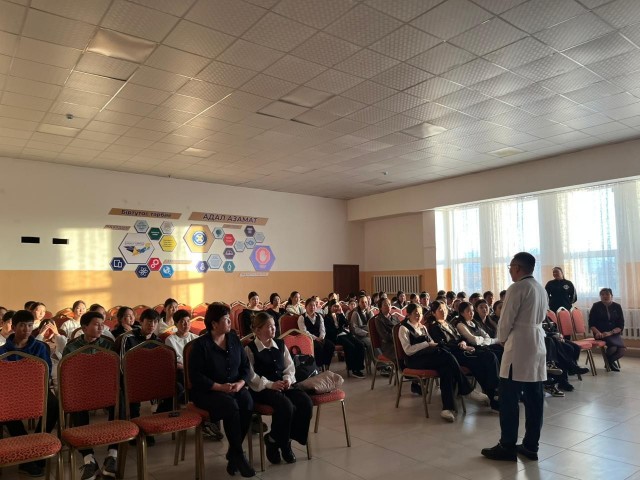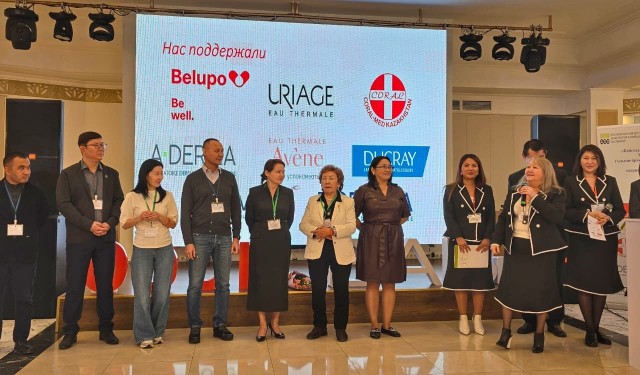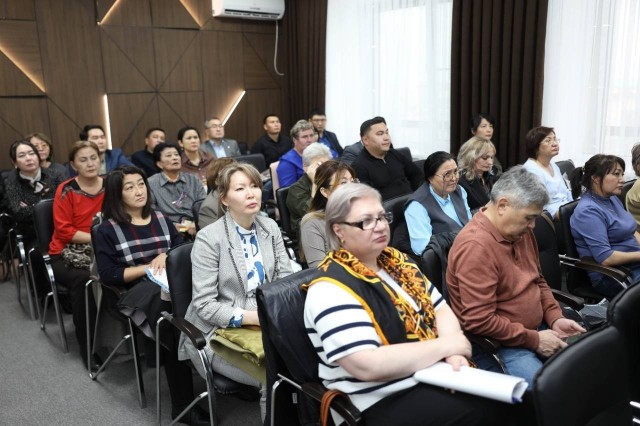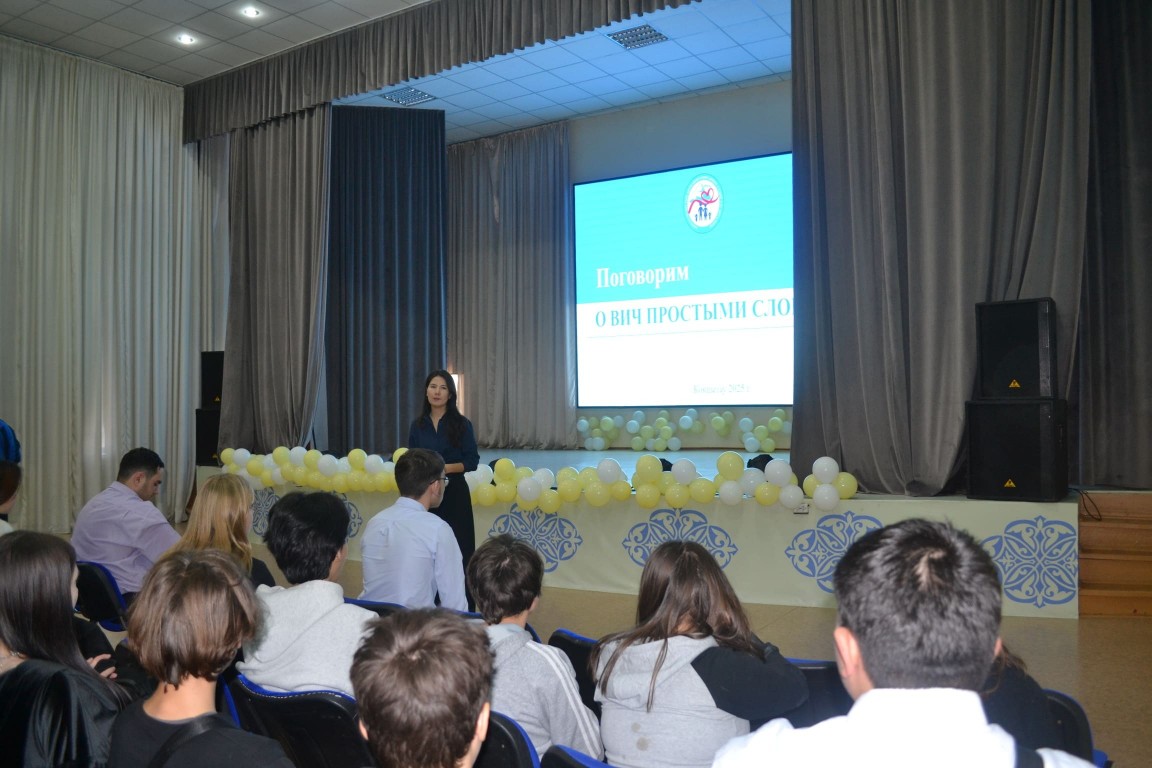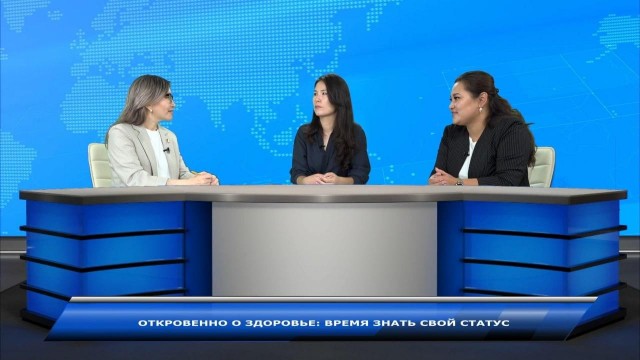November 7, 2025
United Against HIV: Dialogue, Cooperation, ActionOn 6 November 2025, the Regional Center for HIV Prevention hosted a roundtable discussion dedicated to the preparation and implementation of the campaign marking World AIDS Day, held under the theme “From Challenges to Change in the HIV Response.”
The event, organized with the support of the Aktobe Regional Department of Health, brought together representatives of government agencies, non-governmental organizations, educational institutions and health facilities across the region.
In his opening remarks, a representative of the Department of Health emphasized that the combined efforts of public institutions and civil society initiatives remain key to an effective HIV response.
“Today it is important not only to inform, but also to engage communities — especially young people — in prevention efforts. Joint action allows us to respond to HIV more effectively,” said Maksat Seitmukhambetov, Chief Specialist of the Department for Coordination of Clinical Services and Public Health.
Anna Kaspierova, Deputy Head of the Regional HIV Center, presented the theme and concept of the World AIDS Day 2025 Campaign, highlighting the importance of prevention among young people in light of the regional epidemiological situation.
“HIV requires a systemic approach, active engagement of all stakeholders, and ongoing dialogue with young people. Our goal is to foster responsibility for one’s health and to increase public awareness,” she noted.
Dinara Urazalinova, Head of the Prevention Department, outlined the campaign plan, which will run from 10 November to 10 December, emphasizing the importance of intersectoral collaboration. She noted that large-scale outreach events, educational lectures, flash mobs, and information campaigns will play a key role in preventing HIV and promoting healthy lifestyles.
Participants included representatives from the regional Departments of Education and Youth Policy, the Police Department, the Regional Youth Resource Centre (NARKO), the Department of Internal Policy of Aktobe City, the Red Crescent Society of Kazakhstan, public foundations Bolashak Mura and Nasha Zhizn, the West Kazakhstan Medical University named after M. Ospanov, as well as youth health centres of city polyclinics No. 2, 6, 7, and the Family Medicine Clinic.
Participants shared proposals to strengthen information and education activities, expand cooperation with youth organizations, and intensify HIV prevention efforts in educational institutions.
Following the discussion, a joint action plan was adopted to coordinate the efforts of all stakeholders in organizing the World AIDS Day Campaign.
“From Challenges to Change is not just this year’s theme — it defines the direction we must take. Only through cooperation and openness can we achieve real progress in the HIV response,” emphasized Askhat Askarov, Head of the Department for Drug-Related Crime Prevention.
The event concluded with the development of proposals for further collaboration between government bodies, health institutions, and civil society organizations in the field of HIV prevention.
more »November 7, 2025
It All Starts with a Conversation: HIV Prevention Among Young People in Almaty RegionKegen district is one of the most remote areas of the Almaty region. On 6 November 2025, a roundtable discussion titled “From Challenges to Effective Change in the HIV Response Among Adolescents” was held there.
The event was organized by the Almaty Regional AIDS Center and Ms. R. Umirseitova, a methodologist of the Kegen District Department of Education, with the participation of physicians from the Kegen District Central Hospital — obstetrician-gynecologist Dr. A. Kadirova, psychologist Ms. S. Zhanybekova, and narcologist Dr. A. Turlybai.
School principals, deputy principals for student affairs, biology teachers, and school health workers took part in the roundtable — a total of 45 educators.
During the meeting, the participants discussed pressing issues related to the prevention of HIV and sexually transmitted infections among adolescents, the impact of social factors, and the key role of families and schools in promoting responsible health behavior.
“Today it is especially important to speak with adolescents about health openly, in a language they understand. Only an informed person can protect themselves and others,” — emphasized psychologist Ms. Zhanybekova.
As part of the HIV Prevention Campaign Among School-Age Youth, a series of seminars were also held in Kegen district schools — the S. Serkebayev Gymnasium, the O. Zhanabayev Secondary School, the K. Nurpeisuly Lyceum, the I. Zhumagulov School, and the Böleksaz Secondary School. The information and awareness sessions reached a total of 396 students from grades 8–11.
Such initiatives not only increase adolescents’ knowledge and awareness of HIV, but also strengthen cooperation between educators and health professionals in prevention efforts — helping young people develop informed attitudes toward their health and adopt safer behaviors.
more »November 5, 2025
Five Schools in One Day: HIV Prevention Activities Reach Multiple Villages in Raiymbek DistrictOn 4 November 2025, specialists from the Almaty Regional Center for AIDS Prevention and Control carried out a large-scale HIV prevention day in the Raiymbek district. Within just one day, information and awareness sessions were held in five schools across five villages.Seminars took place at the Alban-Asan Barmanbekuly, S. Ashimbaev, N. Omirzakov, K. Baishyganuly, and A. Kunanbayev schools. The sessions for students in grades 8–11 were conducted by epidemiologists from the Center’s Prevention Department — Ms. A. Ibraimova and Mr. N. Kasymov.The lecturers spoke in detail about HIV transmission routes, methods of protection, and the importance of knowing one’s HIV status through testing. They also addressed myths and misconceptions related to HIV, as well as the issues of stigma and discrimination in society. The students actively participated in discussions, asked questions, and shared their thoughts on the importance of supporting people living with HIV.The seminar topics extended beyond HIV and STI prevention to include family planning, healthy lifestyles, and fostering a responsible attitude toward personal health.Local specialists also played an important role in the event. Ms. S. Kukkuzova, a physician from the district Youth Health Centre, delivered a session on the prevention of early pregnancy, while school nurse Ms. N. Kopbosynova discussed the importance of personal hygiene and strengthening the immune system in adolescence.The medical professionals emphasized that maintaining sexual and reproductive health begins in childhood — through good hygiene practices, awareness of one’s own body, and respect for the health of others.The activities were supported by the Raiymbek District Department of Education and engaged a total of 482 students.“The main goal of our work is to help young people understand that HIV is not a sentence but an infection that can be prevented if one knows how to protect themselves. Information is the best form of prevention,” — emphasized Ms. A. Ibraimova, epidemiologist at the Almaty Regional AIDS Center.
more »November 4, 2025
One Day That Changed My LifeA woman’s life is often so absorbed by daily responsibilities that she may not notice how her own health is gradually being neglected. Children, home, work, husband, parents-in-law — the list of concerns is endless.“When my health began to deteriorate, I finally went to the doctor. I bought a whole set of medicines and started taking them, but nothing helped. One evening, I saw a public service announcement on television: ‘Get a free HIV test — take care of your health!’ Those words made me stop and think. I decided to take the test. A day later, the result came — I tested positive for HIV. My world collapsed. Could it really be true? Was I now living with an incurable disease? It felt like a lifelong stigma. How much time did I have left? What if someone found out? That’s how I learned about my HIV status at the age of 23 — and on the same day, I also learned that I was pregnant.”That day is etched in my memory as if it happened yesterday. I went to the Almaty Regional AIDS Center and met my physician. He invited me into a private office, showed me the test results, and began explaining what HIV is and how it is transmitted. I couldn’t believe what I was hearing — I didn’t see myself as being at risk: I had never used injecting drugs and had always been faithful to my husband.The doctor asked for my husband’s phone number and, in my presence, invited him for testing. Soon it became clear that I had acquired the virus from my husband. When I heard that, I felt deep disappointment and even thought about divorce. But after many conversations with the doctor and the psychologist, I realized that, whatever had happened, our lives were now intertwined.A thousand questions flooded my mind. What would my family say if they found out? Most importantly — would I be able to give birth to a healthy baby? Could my child also be living with HIV? These thoughts brought tears to my eyes.My husband and I followed all the recommendations of the specialists at the AIDS Center and started treatment on time. Thanks to the dedication of these professionals, I overcame depression and found the strength to live — for myself and for my child. When I reached nine months of pregnancy, I had a cesarean section. Thankfully, my baby was born healthy — without HIV. The only restriction is that I cannot breastfeed. But my child is growing up cheerful, energetic, and just like any other child.For a year, I continued regular consultations with the doctors, underwent testing, received answers to all my questions, and stayed on antiretroviral therapy. Now, my husband and I are planning to have a second baby, confident that we can once again bring a healthy child into the world.I wish everyone good health and strength — and I want to say one thing: never give up!
more »November 4, 2025
Focus on Remote Areas of Almaty Region: HIV Prevention Among Young PeopleIn the lead-up to World AIDS Day, the Almaty Regional Center for AIDS Prevention and Control, in collaboration with specialists from youth health centres operating within primary health care facilities, is conducting a series of information and awareness activities aimed at preventing HIV among young people.
In addition to HIV-related topics, the programme includes discussions on the prevention of sexually transmitted infections, as well as on adolescents’ mental and sexual and reproductive health.
The main objective of these activities is to prevent HIV infection, promote accurate and informed understanding among young people of HIV and other infectious diseases, and foster a responsible attitude towards personal health.
Special attention is given to outreach in remote districts of the region, where such meetings help expand knowledge and build health-conscious attitudes among school students.
On 3 November 2025, in the remote Raiymbek district of the Almaty region, seminars were held in several villages for students in grades 8–11 from the T. Zhanuzakov, O. Zhandosov, B. Sokpakbayev (Gymnasium), and K. Shormanov schools under the theme “Youth for Health and a Future Free of HIV.”
The seminar was organized on the initiative of Ms. G. Kenessova, a methodologist from the district department of education, with the participation of Mr. N. Kasymov, epidemiologist of the Almaty Regional AIDS Center, and physicians from the Raiymbek District Central Hospital — obstetrician-gynecologist Dr. B. Seidakhmetova, psychiatrist-narcologist Dr. A. Turlybai, and healthy lifestyle promotion specialist Ms. S. Kukkuzova.
According to the experts, HIV and sexually transmitted infection prevention is particularly important among adolescents and young people, as this is the age when life values, behavioral patterns, and attitudes towards personal health are formed. Timely awareness-raising helps reduce infection risks, increase trust in health services, and strengthen young people’s understanding of sexual and reproductive health and mental well-being.
These outreach sessions help reinforce collaboration between the health and education sectors, raise adolescents’ awareness of HIV and STI risks, and enhance the capacity of teachers and health workers to communicate effectively with youth about health and safe behavior. Participants emphasized the practical value of such meetings and expressed readiness to continue cooperation within school and college-based prevention programmes.
more »November 3, 2025
The 5th Multidisciplinary Academy of DermatovenereologyOn 30–31 October, the Kazakh Scientific Center for Dermatology and Infectious Diseases (KSCID) in Almaty held the 5th Multidisciplinary Academy of Dermatovenereology as part of the commemoration of World Psoriasis Day.
The event featured presentations, scientific discussions and hands-on workshops delivered by leading experts in dermatovenereology.
Dr. Venera Aitkulova, dermatovenereologist of the highest category, Candidate of Medical Sciences, Assistant at the Department of Internal Medicine and Pediatrics, “MUS” Medical University, and honorary member of the “ODDL” NGO (Pavlodar), spoke about the specifics of diagnosing and managing psoriasis in children.
Dr. Saule Ospanova, Candidate of Medical Sciences, Head of the Department of Postgraduate and Continuing Education at KSCID, Chair of ODDL and member of the European Academy of Dermatology and Venereology (EADV), presented on the evolution of therapeutic strategies for psoriasis.
Specialists from the Kyrgyz Republic gave presentations on topical steroid withdrawal syndrome and laser therapy for onychomycosis. Physicians from various regions of Kazakhstan also shared their professional experience.
Participants of the Academy examined complex clinical cases, discussed modern diagnostic and therapeutic approaches for skin diseases, and exchanged practical recommendations to improve patient referral pathways.
Particular attention was given to the presentations by KSCID residents. Ten young professionals presented their research findings to senior colleagues and received valuable feedback to further improve their studies.
Competition results:In the “Presentations” category:1st place – A. Satubaldina2nd place – A. Kirillova3rd place – K. Rakhimova
In the “Poster presentations” category:1st place – K. Rakhimova, A. Satubaldina2nd place – A. Tyan3rd place – A. Orash
Congratulations to all the winners!
Events like this contribute to strengthening professional collaboration among physicians, advancing youth science, and introducing innovative approaches in dermatovenereological practice. The Academy has become a platform for sharing experience, fostering a unified scientific community, and promoting high standards of quality care for people with skin conditions.
more »November 3, 2025
Prevention of Vertical Transmission of HIV Under ControlA medical and preventive council was held in Aktobe to review the outcomes for the first nine months of 2025, focusing on the prevention of vertical transmission of HIV.
Aliya Shapiyeva, Deputy Head for Medical Affairs of the Aktobe Regional Center for HIV Prevention, presented the report. She emphasized that timely diagnosis and the use of modern antiretroviral therapy regimens make it possible to virtually eliminate the risk of HIV transmission to newborns.
“Today, preventing the vertical transmission of HIV is one of the key priorities of our work. Thanks to timely diagnosis, up-to-date antiretroviral therapy regimens, and effective intersectoral collaboration among health institutions, we can almost completely prevent HIV infection in newborns. It is crucial that every woman knows her HIV status during pregnancy, registers for antenatal care in time, and receives the necessary support. The joint efforts of healthcare professionals, together with the awareness and responsibility of expectant parents, are the foundation for ensuring that children are born free from HIV,” noted Ms. Shapiyeva.
Health facilities across the region are implementing a comprehensive set of measures to prevent the vertical transmission of HIV through close cooperation among specialists — obstetricians and gynecologists, infectious disease physicians, neonatologists, pediatricians, and general practitioners. These measures include routine HIV testing for all pregnant women twice during pregnancy, provision of antiretroviral therapy at any stage of pregnancy, prophylaxis for newborns, and the promotion of safe infant feeding practices.
According to Orders of the Ministry of Health of the Republic of Kazakhstan No. ҚР ДСМ-6 of 26 January 2022 and No. ҚР ДСМ-156 of 7 December 2022, HIV testing of sexual partners of pregnant women is mandatory.
If HIV is detected in a partner, the pregnant woman is offered pre-exposure prophylaxis (PrEP) with antiretroviral medicines, which are provided free of charge and confidentially.
The prevention of vertical transmission of HIV remains one of the priority areas of national health policy. In the Aktobe region, systematic work is being carried out to ensure early detection, treatment, and follow-up of women living with HIV and their children. The results presented at the medical and preventive council confirm the effectiveness of ongoing measures and demonstrate a steady decline in the risk of vertical transmission of HIV.
more »November 3, 2025
Together for a Clean Home City!The national environmental campaign Taza Qazaqstan continues across the country. Among its active participants are the staff of the Kazakh Scientific Center for Dermatology and Infectious Diseases.
On 1 November, the medical workers enthusiastically joined the community clean-up event. All the necessary equipment was prepared for cleaning the area adjacent to the Center — shovels, brooms, rakes, gloves and garbage bags. The Center’s employees collected fallen leaves, cleared irrigation ditches, watered trees, gathered and removed all the waste. The surroundings became visibly cleaner and more welcoming.
The clean-up day became not only a labour activity, but also a unifying one: staff members communicated, shared positive energy and ideas for improving the urban environment. Such initiatives strengthen team spirit and promote environmental awareness.
Events like this remind each of us of the importance of caring for nature and taking personal responsibility for keeping our city clean. A clean and well-maintained Almaty is an investment in the health, comfort and well-being of all its residents.
more »October 31, 2025
Over 100 Students Took Part in an HIV Prevention CampaignOn 31 October 2025, specialists from the Akmola Regional Centre for HIV Prevention, together with the Youth Health Centre of Panacea Clinic LLP, conducted an HIV prevention campaign for students of the Multidisciplinary Innovation College in the village of Krasny Yar.
More than 100 first-year students participated in the meeting. For many, it was the first opportunity to openly discuss important topics related to HIV and sexually transmitted infections.
The discussion focused not only on HIV transmission routes and prevention measures but also on the importance of taking personal responsibility for one’s own health.
As noted by Assel Baltabayeva, Head of the Prevention Department at the Regional HIV Centre, “Knowing your HIV status is part of a modern culture of health.”
According to Ulpan Amanbayeva, psychologist at the Youth Health Centre, “Such meetings help young people not only to receive accurate information, but also to develop self-awareness, respect for others, and skills for safe sexual behaviour.”
The event took place in a friendly and trusting atmosphere. Students actively engaged in discussions, shared their thoughts, and asked questions to the experts. Initiatives like this play an important role in fostering a culture of health among young people and increasing awareness about HIV.
more »October 31, 2025
Speaking Openly About Health: It’s Time to Know Your StatusIn Kokshetau, a television programme titled “Line of Truth: Speaking Openly About Health – It’s Time to Know Your Status” was broadcast, where healthcare professionals held an open and honest conversation with a regional TV journalist about key health issues affecting young people.On 30 October 2025, the programme aired on the Kokshe TV channel and featured Assel Baltabayeva, Head of the Prevention Department at the Akmola Regional Centre for HIV Prevention, and Ulpan Amanbayeva, a specialist from the Youth Health Centre of Panacea Clinic LLP.During the discussion, the participants talked about the current HIV situation in the region, access to testing, and the services provided by the HIV Centre and Youth Health Centres. Special attention was given to the prevention of sexually transmitted infections and the growing problem of synthetic drug use among young people.According to Assel Baltabayeva, raising public awareness about HIV and sexually transmitted infections is a top priority for the Centre and an essential part of its collaboration with Youth Health Centres.At the end of the broadcast, the speakers encouraged young people and the public to stay informed about HIV, rely only on credible sources of information, and get tested regularly.The full episode is now available on the official website and YouTube channel of KOKSHE TV.
more »




